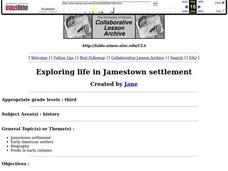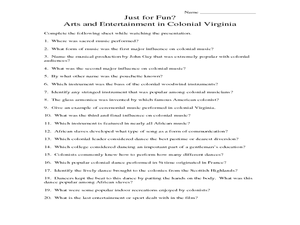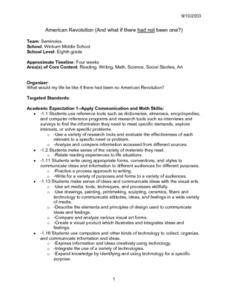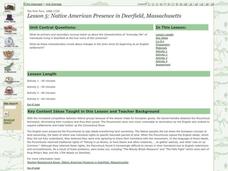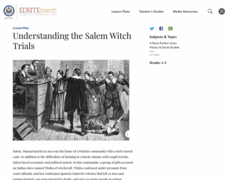Curated OER
Exploring Life in Jamestown Settlement
Third graders examine life in early colonial settlements. Students investigate what settlers ate and create a menu for a fictitious restaurant in a settlement.
Curated OER
Education in Colonial New England
Fifth graders examine schooling now and in New England Colonies. For this compare and contrast lesson, 5th graders describe schools of the present to schools of the past. Students also investigate the goals of schooling and the part...
Scholastic
Teaching About the First Thanksgiving
Learners research information about the Mayflower, Pilgrims, the Plymouth Colony, the Wampanoags, and the first Thanksgiving. They take an online tour of the Mayflower, interpret timelines, create a postcard, and compare and contrast the...
Curated OER
Muses of Independence
Eighth graders explore the entertainment options in colonial America. In this colonial life instructional activity, 8th graders watch a movie about colonial music and arts. Students then respond to questions regarding the movie and also...
Curated OER
Colonial Living: A Look at the Arts, Crafts, History, and Literature of Early Americans
Sixth graders examine the different aspects of life in Colonial America. At home, they make traditional colonial recipes to share with the class. In groups, they read a book about the purpose and act of quilting and create their own...
Curated OER
Why were Americans upset with the British Government?
Fourth graders examine the Revolutionary War in New York State. In this experiential hook lesson, 4th graders adhere to new rules imposed by the teacher. Students document their feelings and frustrations with being taxed on using walk,...
Curated OER
Understanding Loyalist Vs. Revolutionary Ideology
Students understand some causes of the American Revolution. Students learn the viewpoints of the loyalists and the American Revolutionaries. Students learn a timeline of facts which they use to compare and contrast the views of the...
Curated OER
Caught Between Worlds: Frontier Life as Reflected in Captivity Narratives
Young scholars analyze captivity narratives written between the 1600's and 1800's. In this narrative lesson, students think critically about the interaction between Native peoples and the settlers to understand the cultural beliefs held...
Jamestown-Yorktown Foundation
How Did Relations between Britain and the Colonies Change after the French and Indian War?
What does the French and Indian War have to do with the American Revolution? Following the war, Britain issued the Proclamation of 1763 in an attempt to limit the colonists' western expansion. To understand how the proclamation, the...
Stanford University
Native Californians and the Portola Expedition
What was California like before the Spanish came? Class members discover the answer to the question using images of Native Americans and diaries of the early Spanish explorers. Scaffolded activities allow instructors to adapt the...
Huntington Library
Further Exploration - Exploring the California Missions
How did Native Californians and Franciscans influence one another in early California? Learners analyze a few cultural pieces to examine the impact that integration had on Franciscan and Native Californian culture.
Benjamin Banneker Association
Celebrate Benjamin Banneker
Inventor, astronomer, surveyor, mathematician, clock maker. Learners celebrate the life of Benjamin Banneker by building creative analog clocks, making scale models, and solving problems related to surveying. The activities model the...
Curated OER
American Revolutionary War: Two Sides...Two Perspectives
Young scholars investigate the American Revolutionary War era from the perspective of Britain and the American colonists by researching causes, effects, events and people. They compare the views of the Colonists, and the British and...
Curated OER
Slavery in Virginia
Fourth graders assess primary sources to analyze the effects plantation life and slavery had on Colonial Virginia. They study the issues of slavery, rural life, movements, colonization and revolution. Each student makes predictions,...
Curated OER
African-American Art and the Political Dissent during the Harlem Renaissance
Pupils are introduced to the culture of African American art. Using the internet, they research the events surrounding the Harlem Renaissance and discover how it produced a wide variety of art and literature. To end the lesson, by...
Curated OER
American Revolution (And What if There Had Not Been One?)
Eighth graders create scenes that might have existed if the American Revolution had not taken place. They use information they have gathered to plan, produce, and present a variety of products from the perspective of a British citizen in...
Curated OER
Native American Presence in Deerfield, Massachusetts
Eleventh graders examine how in this volatile period, colonial powers and Native groups competed for trade goods and land, coming into conflict repeatedly. They also explore primary and secondary sources.
Benjamin Franklin Tercentenary
Franklin’s Philadelphia: Another Point of View
While Benjamin Franklin enjoyed fame and success in colonial Philadelphia, that was not the experience of all coming to the British colonies. Young scholars trace the life of an indentured servant using a scholarly biography and reading...
Center for History Education
Runaway Slaves: From the Revolution to the New Republic
Who were the enslaved people in colonial America? Using ads from enslavers looking to recapture escaped people, young historians put faces and identities to them. Primary sources, such as wanted ads, help scholars reconstruct who these...
National Woman's History Museum
Pocahontas: The Truth vs. The Legend
Young historians study primary and secondary source materials to try and separate the true story of Pocahontas from the myths, fictional tales, and conflicting accounts of her life.
Curated OER
Where Will I Go From Here?
Learners research the various cultures in Colonial America. In this American history lesson, students analyze and complie the research they find presenting what they have found into a short presentation.
National Endowment for the Humanities
Understanding the Salem Witch Trials
Students describe some of the important elements of life in Puritan New England. They create a timeline of the events of the Salem Witch Trials. They work in groups to explore the concept of multiple interpretations of history.
National Endowment for the Humanities
David Walker vs. John Day: Two Nineteenth-Century Free Black Men
What was the most beneficial policy for nineteenth-century African Americans: to stay in the United States and work for freedom, or to immigrate to a new place and build a society elsewhere? Your young historians will construct an...
Curated OER
Unit 1: Building Historical Background Knowledge: The Road to Revolution 1754–1776
What were the conditions that led to the American Revolution? What are the conditions that lead to revolution in other times and places? Class members examine primary source materials and use evidence drawn from these documents to craft...


